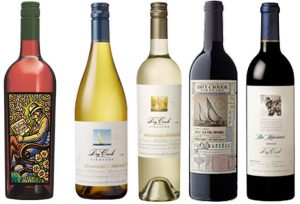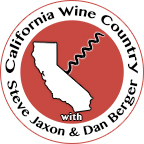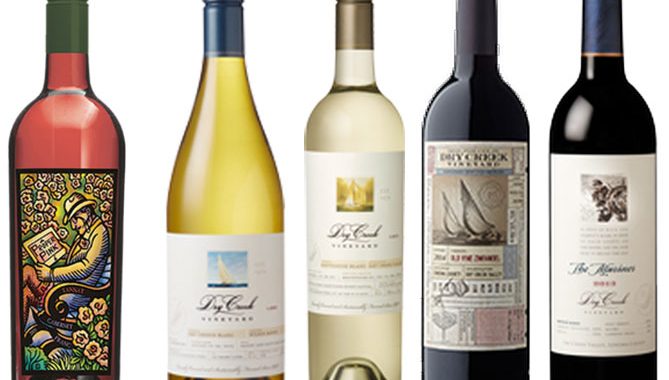Podcast: Play in new window | Download (Duration: 35:28 — 16.4MB) | Embed
Subscribe: Apple Podcasts | RSS | More
Today’s guest is Tim Bell, winemaker at Dry Creek Vineyard. First we taste a very interesting Rosé from Bonny Doon Vineyards in Santa Cruz, then Steve and Dan talk to Tim Bell about Dry Creek Vineyards as they celebrate their 45th anniversary, with tastings of their Chenin Blanc, Sauvignon Blanc, a Zinfandel and a blended red.
Dan Berger opens with a tasting of “A Proper Pink” which is a rosé produced by Randall Graham, owner and “king for life” of Bonny Doon Vineyard in Santa Cruz. It is a slightly sweeter rosé. It is made with Tannat grapes, which is a red wine grape, so to make rosé you have to get the skins out of the juice pretty quickly. It is made from 69% Tannat and 31 % Cabernet Franc. It sells for $15 or $16 per bottle. Dan says that it is so flavorful that you could even put ice cubes in it and its flavor would hold up.

Bonny Doon’s “A Proper Pink” then 4 bottles from Dry Creek Vineyard: Chenin Blanc, Sauvignon Blanc, Old Vine Zin & The Mariner.
Steve asked Tim to describe how he got into the wine business. He grew up in Southern California and worked for the Liquor Barn chain and got interested in wine. He studied winemaking at UC Davis, graduated in 1994 and did an internship at Gloria Ferrer, then worked at a few different wineries including Freemark Abbey, for 10 years. Now he has been at Dry Creek for 6 years, since 2011
This year Dry Creek is celebrating 45th anniversary of their first vintage. The rest of today’s show is all about Dry Creek Vineyard with these tastings:
Chenin Blanc: Dan says this is the best Chenin Blanc he has ever tasted. It used to be popular in California but not there are only a few thousand acres and most of it goes into jug wine. It is a dry style, popular because it has beautiful melon fruit and subtle spices of green tea. Chilling it covers the sugars and gives it a weightiness from the sugar which shows up as texture rather than as sweetness.
Sauvignon Blanc: They were the first to plant Sauvignon Blanc in Dry Creek Valley. Dan says that until the pioneers came along to try different vines, we didn’t know what varieties were appropriate for each region. When David Stare planted Sauvignon Blanc in the 1970s, Dan found that it reminded him of the Loire Valley. Both he and Robert Mondavi adopted the name Fumé Blanc for the wine. Tim says that the Loire Valley was indeed David’s inspiration. He explains the other grapes that go into its blend. Dan mentions the aromatics are fascinating, with hints of chamomille tea. Tim also says he tastes ripe limes.Dan says that this variety has a tendency to show its distinctiveness based on the weather and soil where it is planted. Some regions have green herb flavors, others, do not. Tim agrees, as he has made Sauvignon Blanc from different regions.
Dan says that this variety has a tendency to show its distinctiveness based on the weather and soil where it is planted. Some regions have green herb flavors, others, do not. Tim agrees, as he has made Sauvignon Blanc from different regions.
Dan discovered this about Sauvignon Blanc, when talking to somelliers in restaurants, that patrons who ordered Sauvignon Blanc ended up spending more money on their checks because they would order two bottles.
Then Steve asks Dan to sum up the history of Dry Creek. When David Stare planted Sauvignon Blanc, he discovered it was ideal. We didn’t really have a varietal culture yet in this country but these early plantings helped establish it. Pedroncelli was another pioneer, with Zinfandel. The Dry Creek area was, at one point, for home wine making during Prohibition. Since in certain states it was illegal to make wine even at home, they shipped “wine bricks” with “warnings” saying, “do not add 30 gallons of water and some sugar or else this will ferment.”
2014 Old Vine Zinfandel: This wine comes from a grape that ripens unevenly, which Tim says contributes to its unique flavor. Dan finds flavors of black pepper and mocha, but not woody, but cocoa-like and black cherry and rasberry. Steve finds that it is smooth, and doesn’t slap him in the face like some Zins. Dan says there is a handful of California Zins that deliver this kind of fruit in the $60 range, but this one sells for $38, making it a great bargain value.
2013 The Mariner: This is a Bordeaux-inspired blend. Tim describes the wine as changing from year to year, based on the best available that year. 2013 was an intense vintage for the Bordeaux reds, dark with lots of tannins. So this time he used more Malbec than usual, because it is softer and rounded out the profile.
Dan says this is the wine to have with a steak. It’s big and bold but doesn’t have overripe characteristics. It has a Claret-like finish and reminds him of a Bordeaux in the aftertastes. He says it is delicious but would lay it down for 10 to 15 years, even 20. It has beautuful structure and good acidity and is “…structured to go the distance.”
Tim says the winery is getting ready to release some Cabernet Franc, which Dan wants to taste when it’s ready.
Dan says that Dry Creek Vineyard and Tim Bell have a real success story, even if Dry Creek does not have a flashy reputation as it deserves to have.

